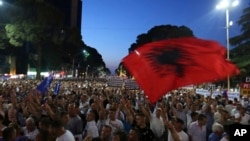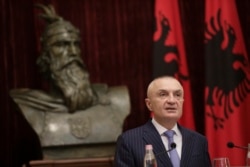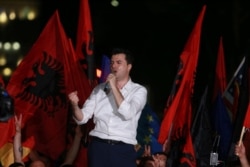Albania's political leaders are bickering over the timing of the next election, while diplomats and officials from the European Union, United States and the Organization for Security and Cooperation in Europe are urging calm.
Albania's president announced a new date for local elections, contradicting the prime minister, whose ruling Socialists insist elections should proceed on Sunday as scheduled.
Albania's political turmoil deepened Thursday when President Ilir Meta said the vote would take place Oct. 13, having previously announced that he was canceling this weekend's vote because of an opposition boycott.
Before Meta's press conference concluded, however, Prime Minister Edi Rama tweeted that Sunday elections would proceed as planned.
EU negotiations
Analysts say the success or failure of Sunday's elections could help or hurt the western Balkan nation's efforts to start negotiations for full membership in the European Union.
Meta says his decision to postpone elections aims to send "a positive message to European partners" — namely, that it would be unethical to hold elections without full participation of the entire electorate.
Either way, says Rama's camp, choosing election dates is not for the president alone to decide, but an issue best settled in the courts.
Albania's judicial system, however, has been largely paralyzed by anti-corruption screening conducted by Tirana to comply with strict EU accession criteria.
Screening results deemed nearly two-thirds of Albanian judges unfit for the bench; only two of 17 justices remain on Albania's Supreme Court.
Risk of violence
Thursday's calls for conflicting election dates poses a risk of confrontations outside polling stations, where opposition loyalists are threatening to prevent voters from casting ballots.
Opposition leaders have also said they'll refuse to recognize any election results.
U.S. Deputy Assistant Secretary of State Matthew Palmer said he expected elections to go forward on Sunday, and that he hoped for a smooth, transparent process.
"After the elections, there'll be an opportunity for the Constitutional Court to be formed, and we hope that any disputes about the timing of elections can be worked out through Albanian institutions," he told VOA's Albanian service.
Asked whether the opposition boycott would compromise the legitimacy of the election results, Palmer said: "It's certainly less than ideal that there is a local election that is being conducted without the participation of the opposition, but that doesn't mean that the elections themselves are not valid."
"People will have the opportunity to come out and vote and express themselves," he said. "Nobody should interfere with that. People who choose to participate, who choose to vote, should be allowed to do so freely. The people who are elected should be allowed to take office and to govern."
Adding that the OSCE has a monitoring mission of 280 observers on the ground to observe Sunday's vote, Palmer said he was hopeful that "events of June 30th take place peacefully and in as smooth a fashion as possible."
"And we would call on the leaders of the opposition to make clear to their supporters that there should be no violence on June 30th, that nobody should interfere with the rights of people to participate in the elections — those who choose to do so," he said, later adding that government officials, too, should actively discourage violence.
"Peaceful protest is a part of democratic governance, that's perfectly normal," he said. "We saw on the 21st of June that the opposition is entirely capable of making its case peacefully and in a manner that is consistent with democratic practice. We'd like to see the events of June 30th move forward with no violence, and we would urge the leaders of the opposition to make that clear to their supporters."
Long-simmering tensions
The center-right Democratic Party-led opposition of Lulzim Basha has been holding protests since mid-February over allegations of vote-rigging and government links to organized crime, and it has asked for an early national election.
Basha met with Meta earlier Thursday, while Rama, whose Socialists have started a procedure to try to impeach Meta, declined to meet with the president.
Last week, the European Union postponed a decision on whether to open accession negotiations with Albania and North Macedonia, saying it hoped to reach "a clear and substantive decision as soon as possible, and no later than October 2019."
EU officials also issued a statement insisting that Albanian citizens must be able to exercise their right to vote in an orderly and peaceful manner.
OSCE officials on Friday called on Albanian political leaders to engage in a "constructive dialogue" and ensure that Sunday's election is peaceful. It added that "both the perpetrators and instigators of violent acts should be held legally accountable."
This story originated in VOA's Albanian service. Some information came from The Associated Press.






